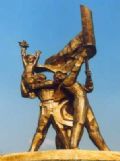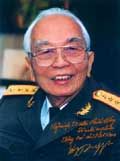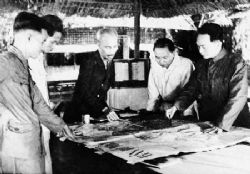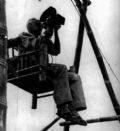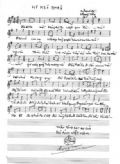|
|

Our soldiers crossing
the Muong Thanh Bridge towards the French
Commandnbsp;Head Office.

General De
Castriesnbsp;and all of the French General Staff in Dien Bien Phu
were captured
alive.
| At 5.30 p.m, on May 7,
1954, Gen. De Castries and all of the general staff of the complex of
fortified strongholds in Dien Bien Phu were captured alive by our army.
All the other enemy troops surrendered. The Dien Bien Phu Campaign won
total victory after 55 days and nights fighting without a respite. This
extract from the reminiscences titled “Dien Bien Phu – A Historic
Rendez-vous ” by Gen. Vo Nguyen Giap depicts the historic moment of great
valor and gallantry.
... At 3
p.m sharp, the army got the order: “Launch the general offensive on Muong
Thanh, without waiting for nightfall. The units in the East will make a
direct thrust at the central sector, the units in the West will launch
their assaults, and both will march on the enemy command headquarters.
Strike hard and tighten the encirclement that neither De Castries nor any
of the enemy troops can escape.”
On
the battlefield, Company 360 of Battalion 130, together with Tran Quai,
Battalion Political Commissar, were all present at the fortified
stronghold 508. Ngo Trong Bao, Deputy Battalion Commander, sent the forces
of Battalion 154 to stronghold 509, which was the last entrenched
fortification to defend the Muong Thanh Bridge, then he held a lightning
pow-wow with the Battalion Political Commissar Tran Quai before giving the
order to Company 360 to march on the central sector, just when the flames
of the blasts were rising up higher and higher. In next to no time,
Company Commander Ta Quoc Luat took Company 360 dashing across the Muong
Thanh Bridge under the intense fire of the 4-barrel heavy
machine-guns.nbsp;
Seeing
that the enemy offered little resistance, Luat ordered his men to leave
the trenches, at the time teeming with enemy troops and jump up to the
ground, and rush along a shortcut to Gen. De Castries’ headquarters, using
a puppet armyman as a guide. The watch-towers sent in their reports: Our
armymen were fighting from three directions, launching assaults on the
central sector, Battalion 312 from the East crossing the Muong Thanh
Bridge, Battalion 308 from the West opening a breakthrough in the
airfield, and from the Southwest to Lili, in the direction of De Castries’
headquarters. The enemy offered merely sporadic resistance. Quite a few
enemy groups came out to surrender and white flags were popping up in the
area of Muong Thanh in ever larger numbers. Mr. Thai (i.e. Gen. Hoang Van
Thai) repeatedly reminded the units: “Tighten the encirclement and don’t
allow any single enemy soldier to escape!”
At 5.30
p.m, Battalion 312 reported: “All the enemy troops at the central sector
have surrendered. Gen. De Castries has been captured alive!”
The jungle
where the Front Command was based had been very secret, strict and
stringent, but all of a sudden, it became alive with bustling atmosphere,
like the roaring surge of sea waves. All officers and men were cheering
and shouting, dancing and waving their hands in the air, hugging and
jumping for immense joy just like little kids.
The joy
had not yet come to me, though. Was it a certainty that the adversary
general had been captured? One thousand five hundred enemy troops remained
there, in Hong Cum sector.
From Muong
Thanh, the units reported: “The enemy troops are coming out to surrender.
Some walk along the roads, singing aloud. Our armymen are also running off
theirnbsp; defence works, dancing and jumping on the banks of the
communication trenches. Many of them fire in the air, sending up blue and
red flares to celebrate the victory.”
The
Campaign Command gave its order to the units: “The fight is far from over.
All must be in their combat positions. Don’t allow any single enemy
soldier to escape. Use the public-address network for enemy agitation to
make an appeal to them and guide them to surrender. This is the message:
‘Surrender! You’ll be well treated! Hold white flags and walk in orderly
files. It is strictly prohibited to destroy arms and ammunitions. Anyone
who still holds his gun must keep its muzzle down to the ground!’ ”
Right after that, I asked Mr. Le Trong Tan:
- Is it true that De Castries
has been captured?
-nbsp;
Commander-in-Chief, it’s reported that he’s been captured.
-
How could they know he’s De Castries?
Mr. Tan kept mum.nbsp;nbsp;
- It’s of
great necessity to capture De Castries alive. Don’t allow the enemy to
fraudulently swap their commander. You should compare him with his
identity, checking his army rank and badge. You’ll be held fully
responsible for this. Have you got a photo of De Castries?
The unit
answered no. A cadre at the battlefront used a jeep to take a photo of De
Castries to the unit.
Mr. Le
Chuong and Mr. Nam Long reported in from Hong Cum that the enemy forces
seemed to be planning to thrust out for their escape to Laos. The Campaign
Command ordered Battalion 308 to send a unit for swift reinforcement of
Hong Cum, closely coordinating with Battalion 304 in hot pursuit of the
enemy troops, wiping them out and not allowing any of them to escape.
Roaring
and rumbling was all around. It was impossible to restrict and restrain
the noise and the joy of all people. The guards had to lower the bamboo
plaits of the windows of the headquarters office to keep it quiet.
The order
for Battalion 312 to send in its immediate report on the capture of De
Castries was reiterated, each minute of waiting then seeming to last very
long.
Some
moments later, Mr. Le Trong Tan phoned back to the headquarters,
reporting: “It’s true that De Castries and all the general staff of the
complex of fortified strongholds have been captured. De Castries still
wears his army badge and that we have checked his personal documents and
signature with great care.”
I asked him again:
-
Have you seen De Castries with your own eyes?
Mr. Tan answered joyfully: “Commander-in-Chief, De
Castries and the French command in Dien Bien Phu are standing in front of
me here. He’s still holding his ‘stick’ and wearing his red cap.”
I
immediately reported to the Party Central Committee and Government that
our army in Dien Bien Phu had won total triumph.
… At
midnight, Mr. Le Chuong phoned me, reporting all the enemy troops in Hong
Cum sector, including Lalan, deputy commander of the complex of entrenched
fortifications, in charge of Hong Cum sector had surrendered.
And so,
after 55 days and nights of grim fighting, the historic campaign won total
victory.
nbsp;I
lay down on the grass mattress, unable to sleep. “By now, Uncle Ho and the
Party Central Committee must have got the news. Tomorrow, perhaps the army
will receive a letter of commendation from Uncle Ho. Comrade Pham Van
Dong, now in Geneva, will be in a new position at the bargaining table.
Our comrades and the Soviet and Chinese comrades have been looking forward
to this information every hour … The national flag has been hoisted high
by our people on the historic battlefield. Our army has grown up so fast.
The Navarre Plan has thus gone up in smoke. The complexion will change.
Now that Dien Bien Phu is finished, where will we fight on tomorrow?” The
joy made me almost sleepless that night.
Photos: Filesnbsp; | 

